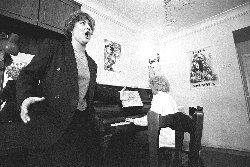Natalia Kysla’ s debut in the Tsar’ s Bride

On January 31, the National Opera of Ukraine presented Rimsky-Korsakov’s Tsar’s Bride . This unusual performance honored Anatoly Mokrenko’s 70th birthday. In addition, for the first time the part of Liubasha was performed by the theater’s young soloist, Natalia Kysla. This role is her tenth on the renowned stage of Kyiv opera. Previously she sang the part of Duniasha in the same opera. Incidentally, Natalia knows all mezzo soprano parts in the Tsar’s Bride . Liubasha is a special part which magically attracts every singer. All mezzo-sopranos dream of it . However, few have dared to play this role on Kyiv stage because the brilliant name of Larysa Rudenko hallowed the tradition of performing Liubasha in this theater. This role fully captivates any performer, making her constantly focus on this complicated and spectacular image of a strong Russian woman. There is a well-known story about young Tamara Siniavska who, when studying her role of Liubasha, concentrated seemingly without end. One day, when she was in a subway train, musing over her future treatment of the role, she suddenly sang aloud, “No, you can’t leave me!”
Natalia Kysla is the daughter of Svitlana Kysla, a Merited Artist of Ukraine, who also brilliantly sang the part of Liubasha. Natalia won her part in this performance rather unexpectedly, so the last week before her debut, she was very tense. Her mother Svitlana was present at the rehearsals with the concertmaster. Once, while listening to her daughter sing, she said excitedly, “A new Liubasha is coming into existence!”
Finally, the moment came for Natalia Kysla to appear onstage. Maliuta Skuratov, played by another first-timer, young bass Oleh Sichnev, urges her towards the guests. Liubasha was the embodiment of tenderness and agitation. At the guests’ insistence, she sings her song a-cappella, a true challenge for any singer. She was face-to- face with the audience for the four-and-a-half minutes, and defined the mood of the whole part. Kysla succeeded in literally enchanting the public.
The performance of the duet with Griaznoy, sung by People’s Artist of Ukraine Vyacheslav Lupalov, was also impeccable. Her line, “I see — you don’t love your Liubasha anymore,” was full of unbearable grief. Her voice flowed like a river of never-ending woman’s tears. Then came the sound of bells, not simply summoning the parish for the morning prayers, but a tocsin of fate keeping time with the insane rhythm of Liubasha’s heart. Now desperation and insatiable love are all that is left for her. “Wait, where do you go?” were the last words former Liubasha says to Griaznoy and then embraces the rungs of the ladder he just climbed. Immediately we see a new person. Her grief has doubled her powers, and she resolves to do the impossible. In this scene, Kysla’s whole appearance stresses the change in her character’s soul. This moment is very difficult in terms of technique. No matter what is going on inside Liubasha, at this point the singer needs support from the conductor. Without his signal it would be too hard to start singing in time, since the score calls the orchestra to play very rapidly and impetuously. The conductor, People’s Artist of Ukraine Ivan Hamkalo, did his best to support Kysla’s debut.
In the second act, Liubasha is an unapproachable priestess at the temple of her Love. She yields to Bomely, sung by Volodymyr Fedotov, but she remains strong. The whole episode including duet and arioso was performed very convincingly.
In spite of the singer’s young age, there is mature artistic technique in her Liubasha. Natalia Kysla’s voice is characterized by vocal impeccability. Every register in her repertoire features an even sound. She sings with a broad timbre and beauty, and produces melodious sound.






